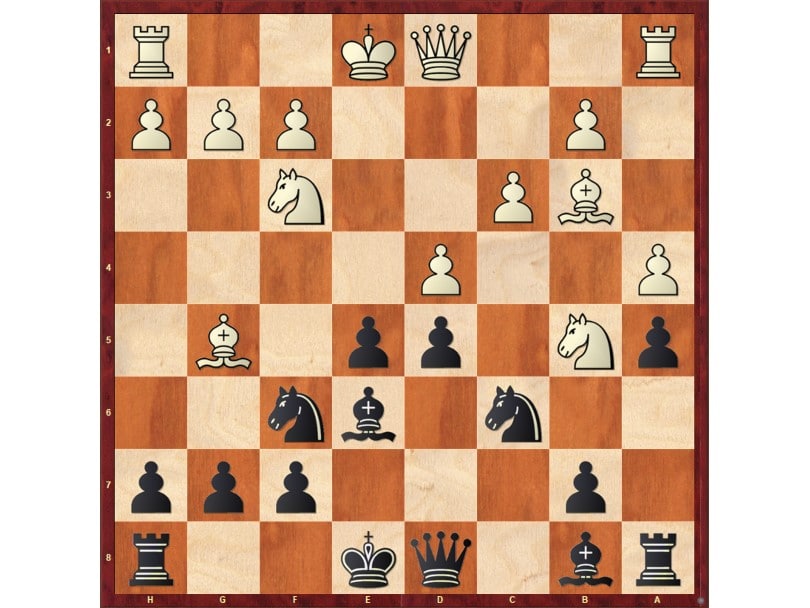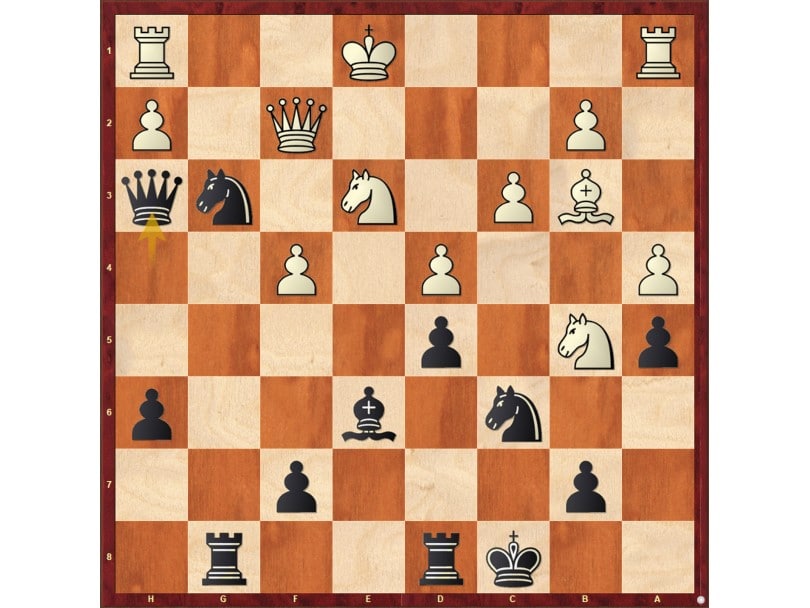Do you analyze every game you play? For a long time, I did not. Please don’t make the same mistake.
Learning from your own mistakes is the most effective way to improve. You avoid making the same mistake twice. And you find out your strengths and weaknesses.
When you make a mistake, there are only three things you should ever do about it: admit it, learn from it, and don’t repeat it.
– Paul Bear Bryant, American Football Player & Coach
I already wrote an article about a very easy way to assess strengths & weaknesses and then train accordingly. Now, it is time to focus on the game analysis process.
This process mainly applies to over-the-board classical chess, but can also be modified and applied to Online games or faster time controls.
I call it a process because I always do it in two steps. Step 1 is done immediately after the game was played and takes about 5-15 minutes, depending on the depth and length of the game. This article focuses on Step 1.
Step 2 will be a more deep analysis at home when the emotions are cooled down and I have much more time. This will be the theme of the follow-up article.
Analyze Your Game Immediately After Finishing To Play
This first step is very important. But, most people will either completely skip it or do it wrong. After the game, it is still possible to remember most feelings and variations that led you to your decisions.
In order to cure the cause (thought process) and not only the mistake (wrong move) it is extremely important to write down feelings and calculated lines during a game!
If you do that only some days after a game, I promise you it will be nearly impossible to remember your thought process or exact calculation during the game.
So, the first thing I do after a game is going to my room and type the game into Chessbase. Because of some recent events, I do not really like to mention that company positively.
But at the same time, it is the best product I know of at the moment. I am sure there are alternatives to keeping your games in one database. The important thing is that you have all your games in a database, where you can easily find and access them.
Even if nearly all my games are transmitted live, I still try to type in the moves manually. It is a good way to relive some moments of the game.
And most importantly, I avoid the big temptation to watch the engine assessment of the games online. While I put in the moves, I will stop at critical moments and enter my thoughts and some lines I calculated.
Opening Stage
The first critical moment is the moment my preparation ended. I will write the opening I expected until when I could recall 100% of my preparation.
At this moment I will simply write down my knowledge during the game. It is not the right time to check the theory or the assessment of the engine. This will come later.
In order to illustrate it, let us look at the following moment from a recent game of mine.

As my opponent basically only plays one opening, I came well prepared.
Now after his last move 12.d3-d4 I was out of the book. I noted: “the first new move. I could remember the line 12.0-0 Ra6!? 13.d4 e4 14.Ne5!? where black is to be preferred slightly. Thus, I thought 12.d4 is not precise and I started to look for an advantage already”.
Note how I write down my feelings. The assessment of the position is linked very closely to the final decision.
If I think I am better, I will reject all the lines that are about equal.
If the position, in reality, is equal, I might end up playing a bad move, just because I rejected all the good ones (because they ended up being equal).
Knowing my evaluation, this clearly is a mistake of evaluation or over-optimism and not a chess-related mistake.
If I only look at a position after some time and switch on the engine, I cannot remember what led me to not make the right move. I might then try to cure a completely wrong cause of the mistake, which is not helpful at all.
Middle Game
Let’s get back to the game. After the logical e4 13.Nd2 h6 I commented: “looks natural, even if I would not play g5 after Bh4.” This leaves a clue that I did not really think white would take on f6
. The game went on with 14.Bh4 g5 15.Bg3. This was the first big critical moment, as I had several nice-looking options.

“My first instinct was 15…Bf4, which I ended up playing anyway. But as my opponent used a lot of time for 14.Bh4, I started taking other moves into consideration”.
Then I give the following crazy line: 15…e3?! 16.fxe3 Bxg3+ 17.hxg3 Bg4 18.Qc2 Qe7 19.0-0! after which I write “I was tempted to already go for the kill, but luckily found whites beautiful resource on move 19”.
This is another clue for my (too) positive evaluation of the position. I am black and am already considering very drastic measures, even though my opponent only made one strange-looking move.
Certainly, I also calculated other lines, but I try to just write down the most important ones that influenced my decision-making considerably. After all, this should be done in no more than 15 minutes!
The game went on: 15…Bf4 16.Nf1 Qe7? (too ambitious!) 17.Bxf4 gxf4 18.Qd2 e3 19.fxe3 Ne4 20.Qe2 Rg8!? 21.exf4 0-0-0 22.Ne3 Qh4+ 23.g3 Nxg3 24.Qf2 Qh3. A lot happened and throughout these moves, I again give emotional comments with some small lines for all my critical decisions.

Now, we come to a decisive point in the game, which I usually would not comment on at all! Why? Because I thought White already made his mistake before and I was sure to be better here, while my opponent thought he must be close to losing!
But shortly after the game, my opponent came to me in disbelief and said: “I totally blundered 25.Nd6+! and white is just winning”. He had checked the game with his phone engine just minutes after we finished the game…
Indeed 25.Nd6+! is a game-changer. After Rxd6 26.Rg1 I cannot play Ne4 anymore because the g8 rook hangs with a check! And after 25…Kb8 26.Rg1 the knight on d6 protects the e4 square, so again there is no Ne4! Seeing this in a game is definitely extremely tough.
And frankly speaking, the resource does not really matter too much in the game analysis. Why? Because we were both miles away from finding it!
So, it is a very easy way to just put all the blame on missing that move. Finding this blow in serious time trouble and under attack is very hard. The flow of the game went in a totally different direction.
Now that you know this “big blunder” it gets very hard to look at the whole game unbiased. So by knowing one engine move, you basically destroy the opportunity to learn more from a complicated game.
Conclusion: How To Analyze Your Game Right
After you finish annotating the game, there are 2 small things left to do.
1) Improving Your Opening
At the tournament, it is too early to draw definitive conclusions from the game. But, it is very important to be prepared for the same opening in the ongoing tournament.
What I usually do is shortly check the opening phase and think about what I would do if a future opponent plays the same.
As you need to be sure of the opening phase, this is the first moment you are allowed to use the engine. Only do that step AFTER you annotated the game as explained.
And only check the opening phase, even if you are curious about the evaluation of the game.
In the above-mentioned game, I decided I will play the same line again, as black is already slightly to be preferred. On move 16… I would go for the safe Ne7 instead of Qe7. That’s it. Usually, this really is no big deal and takes only some minutes or even seconds. But, it is very important to think about it, as you should never fall for an opening preparation twice!
2) Preserve Your Confidence
As the tournament goes on, you need to preserve or even boost your self-confidence no matter what! So, what is the best way to do that?
My Sport-psychologist came up with a very interesting approach:
Instead of putting blame on internal things, like “I suck at calculation” or “my shape is bad”, you should put the blame on some outside things like “I slept horribly” or “I could not focus due to XYZ”.
If things went well, you will take all the merit for yourself. Even if your opponent simply blundered a piece, you should tell yourself “I put him under a lot of pressure”.
Now, this might sound very counterintuitive, because I am the first to recommend taking full responsibility for your actions and results.
That is why it is extremely important you ONLY do this during the tournament.
In Step 2, the analysis at home, you will learn how to take full responsibility for all your actions and results. This is only a small trick on your own mind that lets your confidence off the hook for the time being.
Once you did these steps, your mind is ready to move on to the next game.
And that is what you should do.
Forget about what happened, good or bad, take the positive things with you, and get your focus on the next game. You will have enough time at home to ponder over the game and deeply analyze what has gone wrong/right.
But before you start worrying about the next game, be good to yourself and do something you like. You deserved it.
I hope my approach helps you learn more from your games! Read Part 2 to complete your game analysis.
Sincerely,
Noël
P.S.: If you liked this article, then you will probably also like my FREE Guide to organizing your Chess training. Get it here.